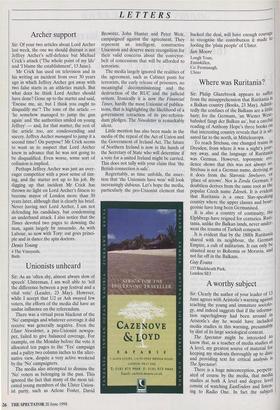Where was Ruritania?
Sir: Philip Glazebrook appears to suffer from the misapprehension that Ruritania is a Balkan country (Books, 23 May). Admit- tedly the confines of the Balkans are a little hazy; for the Germans, 'an Wiener West- bahnhof fangt der Balkan an', but a careful reading of Anthony Hope's three books on that interesting country reveals that it is sit- uated far to the north, in Mitteleuropa. To reach Strelsau, one changed trains in Dresden, from where it was a night's jour- ney away, and the language of Ruritania was German. However, toponymic evi- dence shows that this was not always so. Strelsau is not a German name, deriving as it does from the Slavonic Strelsovo, or `place of arrows'. Nor is Zenda German; it doubtless derives from the same root as the popular Czech name Zdenek. It is evident that Ruritania is a once Slav-speaking country where the upper classes and bour- geoisie have long been Germanised.
It is also a country of continuity; the Elphbergs have reigned for centuries. Ruri- tania, unlike the Balkan lands, never under- went the trauma of Turkish conquest. It is evident that by the 1880s Ruritania shared with its neighbour, the German Empire, a cult of militarism. It can only be situated near to Bohemia or Moravia, and not far off in the Balkans.
Guy Evans
137 Blackheath Park, London SE3


























































 Previous page
Previous page